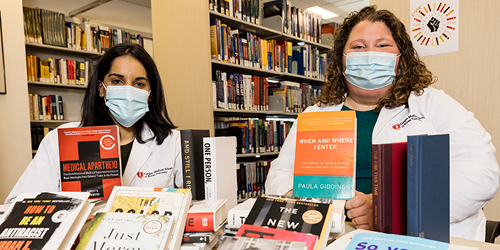With a new library, CMSRU students address racism in medicine
With a new library, CMSRU students address racism in medicine

Medicine has been marked by a long history of racism.
Examples include the notorious 40-year U.S. Public Health Service’s Tuskegee Syphilis Study of nearly 400 men with syphilis who remained untreated, numerous experimental gynecologic surgeries performed on enslaved Black women without anesthesia, the robbery of cadavers from graves for dissection, and many, many others.
While some of these egregious incidents of medical racism happened in the distant past, the influence of racism continues to permeate the health care field today. Students at Cooper Medical School of Rowan University (CMSRU) are taking action to educate future physicians and the medical community about systemic racism—and to eradicate it.
“There are so many different ways in which racism impacts medicine, both on the patient side and on the professional side,” said Menaka Dhingra, a fourth-year medical student at CMSRU and a member of the school’s chapter of the Gold Humanism Honor Society.
“One example is that the rate of enrollment of Black men in medical school has been stagnant for decades,” she continued. “There are people from our communities who aren’t being represented in medicine and then also being denied leadership and academic positions. Then there’s the patient aspect where there is an inherent distrust of doctors within different communities.
“And I think a lot of that has to do with systemic racism. If we want more equitable care and better care for our patients, we have an obligation to address it.”
Taking action
Members of CMSRU’s Gold Humanism Honor Society chapter have taken the lead to hold monthly discussions on racism and medicine, and medical student orientation began with the reading of Fatal Invention: How Science, Politics, and Big Business Re-create Race in the Twenty-First Century by Dorothy Roberts.
They quickly expanded their efforts, establishing an anti-racism library collection at CMSRU and Cooper University Health Care. With $1,500 from the national organization and a matching grant from the CMSRU Center for Humanism, Gold Humanism members collaborated with librarians to select 39 print and e-books addressing racism and racism in medicine and tucked away seed money for future works. The collection includes fiction, nonfiction, memoirs and even poetry.
“We wanted to create a 360-degree experience,” said Lauren Burgoon, a fourth-year medical student from Collingswood.
They also developed a summary of books and resources in the collection, as well as a LibGuide listing books, articles, videos and scholarly journals available to the general public.
In addition, Dhingra created a guide for other Gold Humanism chapters to begin similar projects. The Arnold P. Gold Foundation plans to feature the CMSRU project at a virtual conference this spring.
“We want it to be a living collection,” said Dhingra, a Cedar Grove resident. “We want future chapters of Gold Humanism or different diversity organizations on campus to contribute additional works as they become interested in them.”
“I think all of us working on these initiatives feel a real responsibility to make sure the conversations don’t go away this time – especially within medicine, where there’s a tragic history of racism and problems have continued in the medical community,” Burgoon said.
“With the library collection, we’re hoping to not only highlight the things that have happened, but help people move to the next level. You can’t correct something unless you have a full accounting of what’s happening,” she said.
“I’m proud of our students for their passion in addressing racism because they have really helped move the needle,” said Jocelyn Mitchell-Williams, MD, PhD, associate dean for diversity and community affairs, CMSRU. “Their passion helps to move forward the process of educating others, including the faculty. We all need to take a deep dive and look at this to see how our behaviors, our implicit biases, can impact the care we provide to patients.”
Influence of racism
CMSRU future physicians are well aware of how healthcare professionals may miss the impact of racism on their patients.
“Our patients are so much more than we see in a short visit or what we see in a hospitalization. If we take the extra time to really understand what their lived experience might be, that’s how you’re promoting health within patients. To me it’s especially important when treating children to know that if I do this extra work, I can help start them off on a better foot than by ignoring the reality of what’s happening,” said Burgoon, who plans to become a pediatrician.
“Communities of color have been disproportionately impacted by COVID-19,” Dhingra said. “That underscores that medicine has a large role to play in combating racism in society, and we have an obligation to do it because we’re supposed to be treating everyone equally.”
The library includes everything from Roberts’s Fatal Invention to James Baldwin’s The Fire Next Time to Maya Angelou’s And Still I Rise to Ibram X. Kendi’s How to be an Antiracist, which notes, in part, “No one becomes a racist or antiracist. We can only strive to be one or the other…Like fighting an addiction, being an antiracist requires persistent self-awareness, constant self-criticism, and regular self-examination.”
Confronting these societal topics is critical for medical school students and physicians, Mitchell-Williams said.
“With the climate of the country right now, it’s so important to continue dialogue and education around issues of racism and cultural humility in patient care,” Mitchell-Williams said.